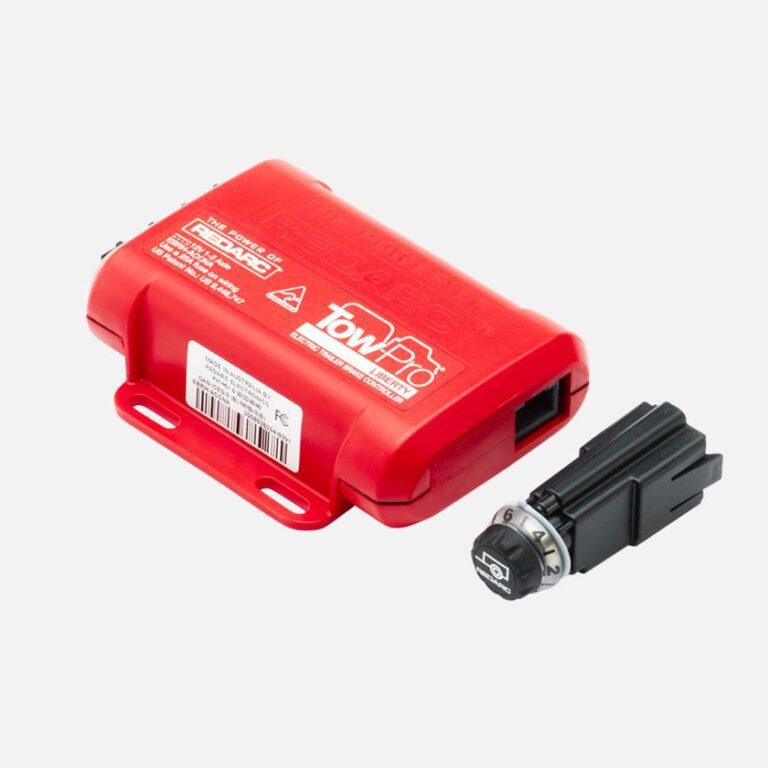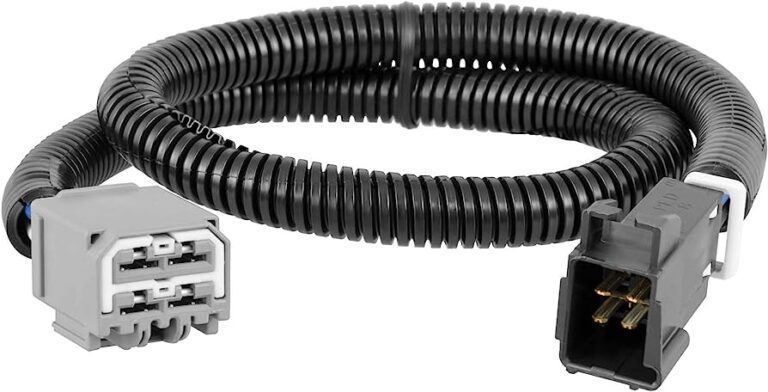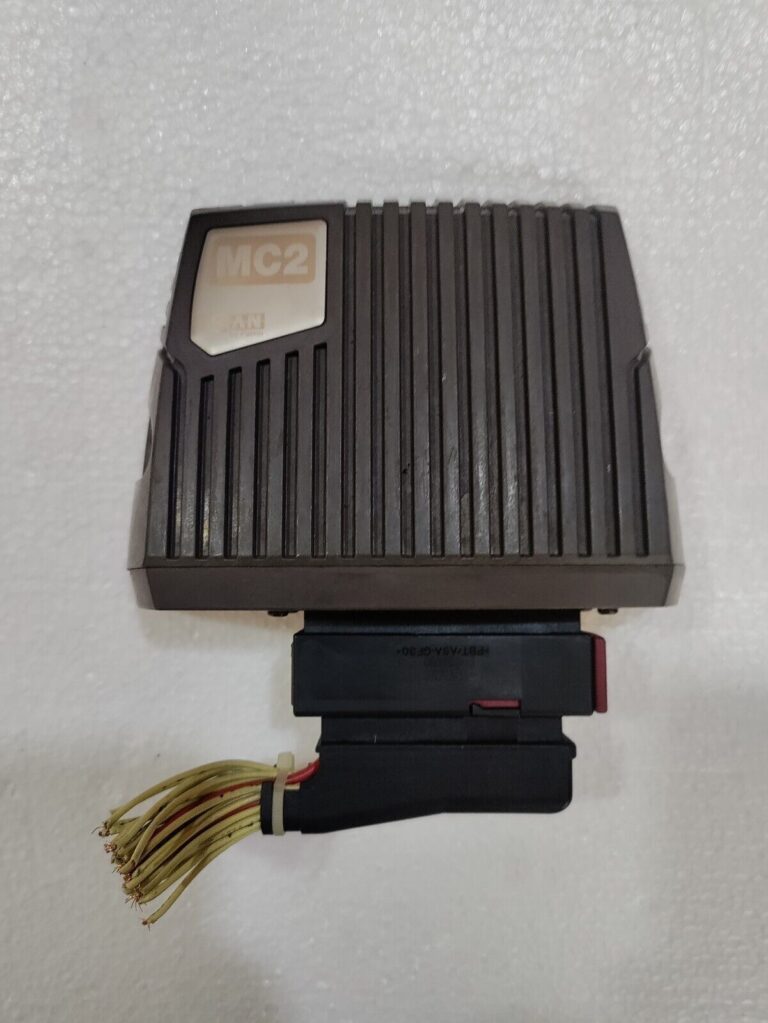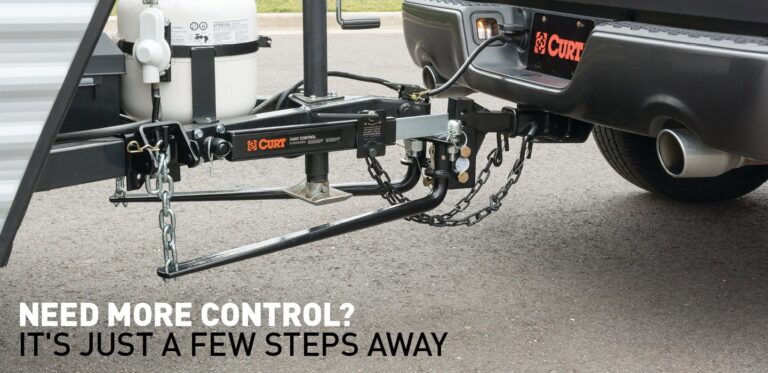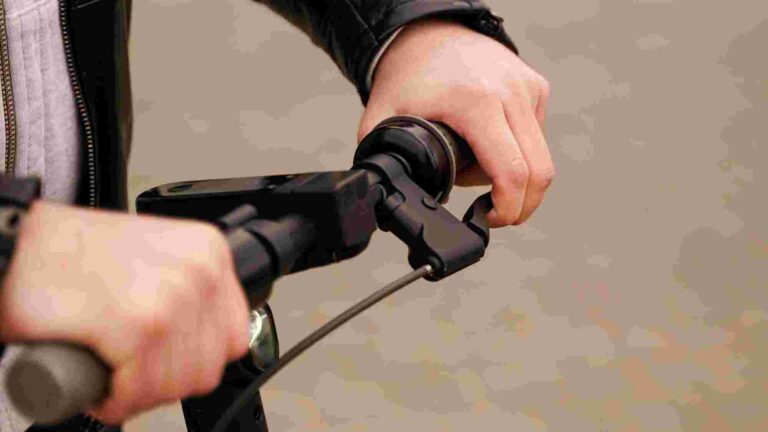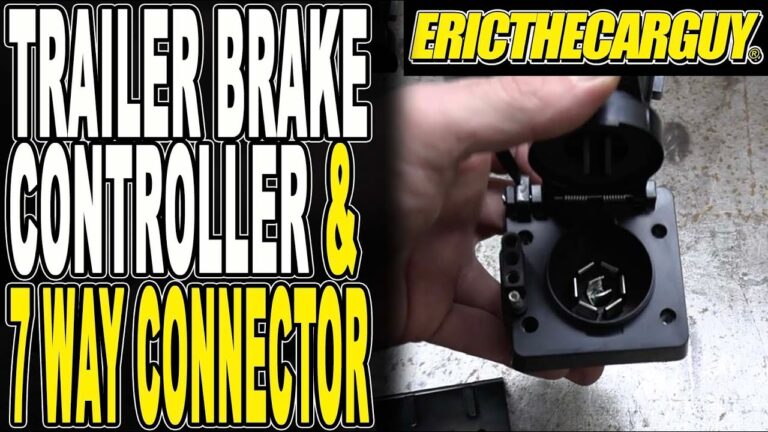Maximizing Safety: Unleashing the Power of Trailer Brake Controllers
Trailer brake controllers are devices that regulate the braking system of trailers, ensuring safe and effective braking in sync with the towing vehicle. These controllers can be adjusted based on the trailer’s weight and braking requirements, providing smoother and more controlled stops.
Additionally, they offer features like proportional braking, manual activation, and brake boost, allowing for precise control and increased safety while towing. With the ability to improve braking performance and reduce wear and tear on both the trailer and towing vehicle, trailer brake controllers are essential for a secure towing experience.

Credit: www.amazon.com
Understanding Trailer Brake Controllers
What Are Trailer Brake Controllers?
Trailer brake controllers are essential components of towing systems that regulate the braking power between the tow vehicle and the trailer. These controllers ensure a safe and controlled braking experience, especially when towing heavy loads. Understanding how trailer brake controllers work is crucial for every towing enthusiast or professional.
Let’s delve into the key points:
- Brake controllers: These devices are installed in the tow vehicle’s cabin and serve as the control center for the trailer’s braking system.
- Electrical connection: A trailer brake controller connects to the tow vehicle’s electrical system, usually through a 7-pin connector or a special brake controller wiring harness.
- Brake signal activation: The controller interprets the brake signal from the tow vehicle and transmits the appropriate braking force to the trailer’s electric or hydraulic brakes.
- Adjustability: Modern trailer brake controllers offer various adjustment options, like gain or sensitivity settings, enabling you to tailor the braking force to match the specifics of your towing setup.
- Types of trailer brake controllers: There are three main types of trailer brake controllers – time-delayed, proportional, and inertial. Each type has its own advantages and suitability for different towing scenarios.
The Basics Of Trailer Braking Systems
To better understand trailer brake controllers, it’s important to grasp the basics of trailer braking systems. Here are the key points:
- Electric brakes: Most trailers utilize electric brakes, which require an electrical connection to the tow vehicle’s braking system. The trailer brake controller sends an electric current to activate the brakes when the tow vehicle brakes are applied.
- Hydraulic brakes: Some trailers, especially heavier ones, may have hydraulic brakes that rely on hydraulic pressure to engage the brakes. In this case, the brake controller modulates the hydraulic pressure for smooth and effective braking.
- Towing capacity: Understanding your tow vehicle’s towing capacity and the trailer’s gross weight rating (gwr) is crucial for ensuring a well-matched braking system. Overloading the brakes or exceeding the towing capacity can compromise your safety.
- Brake wiring: Proper brake wiring is essential for the seamless operation of trailer brake controllers. It’s crucial to use high-quality wiring harnesses or connectors to ensure a reliable electrical connection between the tow vehicle and trailer.
- Integration with abs: Some advanced trailer brake controllers integrate with the anti-lock braking system (abs) of the tow vehicle. This integration enhances braking performance during emergency situations, reducing the chance of skidding or loss of control.
The Importance Of Trailer Brake Controllers
Trailer brake controllers play a vital role in ensuring safe and efficient towing experiences. Here’s why they are so important:
- Enhanced safety: With a properly functioning brake controller, you can maintain control over your trailer’s braking, preventing it from pushing or swaying the tow vehicle during sudden stops or while navigating steep terrains.
- Compliance with laws: Many regions and jurisdictions have specific regulations that require trailers to have functional brakes. Installing a trailer brake controller helps you stay compliant with these laws, preventing any legal issues.
- Extended brake life: By evenly distributing the braking force between the tow vehicle and trailer, brake controllers reduce the strain on the tow vehicle’s brakes, resulting in less wear and tear and potentially increasing their lifespan.
- Reduced risks of accidents: Reliable braking systems significantly reduce the risk of accidents caused by inadequate stopping distances or loss of control while towing. Trailer brake controllers contribute to safer journeys for both you and other road users.
Remember, using a trailer brake controller is not just a legal requirement, it’s a responsible choice that prioritizes safety on the road. By understanding how these controllers work and embracing their importance, you can ensure smoother, safer, and more enjoyable towing experiences.
Types Of Trailer Brake Controllers
Trailer brake controllers are essential for safe and efficient towing. These devices allow you to control the brakes of your trailer from within your vehicle, ensuring smooth and controlled braking. There are several types of trailer brake controllers available in the market, each with its own unique features and benefits.
In this section, we will explore the different types of trailer brake controllers to help you make an informed decision.
Inertia-Activated Brake Controllers
Inertia-activated brake controllers, also known as pendulum or pendulum-style brake controllers, are one of the most common types available. These controllers use a pendulum mechanism to activate and adjust the trailer brakes based on the deceleration of the towing vehicle.
Here are the key points to know about inertia-activated brake controllers:
- Activated by the deceleration force of the towing vehicle
- Senses the braking action and adjusts the trailer brakes accordingly
- Easy to install and operate
- Suitable for most towing applications
- Provides proportional braking, allowing for a smoother and more controlled stopping experience
Time-Delayed Brake Controllers
Time-delayed brake controllers, as the name suggests, function by applying a preset amount of braking power to the trailer after a specific time delay. These controllers are commonly found in older vehicles and trailers. Below are the key characteristics of time-delayed brake controllers to consider:
- Apply a constant amount of braking power after a predetermined delay
- Simple and straightforward operation
- Less expensive compared to other types of controllers
- Ideal for light to moderate towing
- May have a less precise braking response compared to proportional controllers
Proportional Brake Controllers
Proportional brake controllers are designed to apply the trailer brakes in proportion to the deceleration of the towing vehicle. This ensures that the braking force is adjusted smoothly and proportionally, resulting in a more controlled and comfortable towing experience. Here are the key features of proportional brake controllers:
- Provide instant and proportional braking response
- Automatically adjust the braking force based on the towing vehicle’s deceleration
- Deliver smoother and more controlled stops
- Suitable for a wide range of towing applications, including heavy loads
- May require professional installation for optimal performance
Electronic Brake Controllers
Electronic brake controllers are the most technologically advanced type of trailer brake controllers available. These controllers utilize sophisticated electronics to monitor the towing vehicle’s braking signals and apply the appropriate braking force to the trailer. Consider the following points about electronic brake controllers:
- Utilize advanced technology for precise and accurate braking control
- Monitor the towing vehicle’s brake pedal input and adjust the trailer brakes accordingly
- Offer customizable settings for different towing conditions
- Provide smooth and proportional braking response
- May require professional installation and calibration
Choosing the right type of trailer brake controller for your towing needs is crucial for safe and hassle-free travels. Whether you opt for the simplicity of time-delayed controllers, the proportional control of inertia-activated controllers, or the advanced features of electronic controllers, make sure to consider factors like the towing load, vehicle compatibility, and personal preference.
Selecting The Right Trailer Brake Controller
When it comes to towing trailers, having a brake controller is essential for maintaining control and ensuring safe stopping. But with so many options available, how do you select the right trailer brake controller for your needs? Let’s explore some factors to consider when making this important decision.
Factors To Consider
- Trailer weight and size: Determine the weight and size of your trailer, as this will help you determine the type of brake controller you need. Heavier trailers typically require more powerful brake controllers to effectively stop the load.
- Towing vehicle compatibility: Check the compatibility of the brake controller with your towing vehicle. Different vehicles may have different wiring systems and electrical connections, so it’s important to ensure they are compatible to ensure proper functionality.
- Braking system: Consider the type of braking system your trailer has. Some trailers may have electric brakes, while others may use surge or hydraulic brakes. Choose a brake controller that is compatible with your trailer’s braking system to ensure optimal performance.
- Power output: Evaluate the power output of the brake controller. Higher power output allows for greater braking force, which is crucial for larger trailers or when towing heavy loads.
- Controller type: Decide between a time-based brake controller or a proportional brake controller. Time-based controllers apply a predetermined amount of braking force, while proportional controllers adjust the braking force based on the deceleration of the towing vehicle. Proportional controllers offer more precise and smoother braking.
Matching The Controller To Your Towing Setup
Once you’ve considered the factors mentioned above, it’s time to match the brake controller to your specific towing setup. Here’s how:
- Research and compare: Take the time to research different brake controllers and compare their features, specifications, and customer reviews. This will help you narrow down your options and make an informed decision.
- Seek expert advice: If you’re unsure about which brake controller to choose, consult with a trusted professional or seek advice from experienced trailer owners. They can provide valuable insights and recommendations based on their own experiences.
- Consider your budget: Determine your budget for a brake controller and look for options that fall within that range. Remember, a higher price doesn’t always guarantee the best performance, so weigh the features and quality against the cost.
Installing And Setting Up Your Brake Controller
Once you’ve selected the right brake controller, proper installation and setup are crucial. Here are some important steps to consider:
- Read the instructions: Familiarize yourself with the manufacturer’s instructions provided with the brake controller. These instructions will guide you through the installation and setup process, ensuring that everything is done correctly.
- Locate the right spot: Find a suitable location in your towing vehicle for mounting the brake controller. It should be easily accessible and within reach while driving. Ensure proper visibility and that it doesn’t interfere with other controls.
- Connect the wiring: Follow the instructions to connect the wiring between the brake controller and your towing vehicle’s electrical system. Use appropriate connectors and ensure proper grounding for optimal functionality.
- Adjust settings: Once the brake controller is installed, set the appropriate braking intensity and gain. This will ensure that the brakes engage smoothly and efficiently. Refer to the manufacturer’s instructions for specific guidance on adjusting these settings.
By carefully considering the factors mentioned above, selecting the right trailer brake controller and properly installing it, you can enhance the safety and control of your towing experience. Keep these tips in mind, and enjoy peace of mind knowing that you have made a well-informed choice for your trailer braking needs.
Maximizing Safety With Trailer Brake Controllers
The Role Of Trailer Brake Controllers In Safe Towing
Trailer brake controllers play a crucial role in ensuring the safety of your towing experience. These electronic devices are installed in your tow vehicle and allow you to apply the brakes on your trailer with ease, enhancing control and reducing the risk of accidents.
Here are the key points to understand:
- Improved braking performance: With trailer brake controllers, you can maximize the stopping power of your trailer brakes, enabling you to come to a halt quickly and safely.
- Reduced wear on tow vehicle brakes: By utilizing the trailer brakes effectively, you take the load off your tow vehicle’s brakes, preventing premature wear and tear.
- Enhanced control and stability: With independent control over the trailer brakes, you can maintain stability while towing, especially in emergency situations or while navigating steep slopes.
- Compliance with regulations: Trailer brake controllers are often required by law, depending on the weight of your trailer. Using them ensures you’re in compliance and avoids potential penalties.
Setting The Right Brake Force For Optimal Stopping Power
Choosing the correct brake force setting for your trailer is vital to achieve optimal stopping power. Here’s what you need to know:
- Understand your trailer’s weight: Determine the gross weight of your trailer, including any cargo. This information will help you determine the appropriate brake force setting.
- Start with a conservative setting: Begin with a lower brake force setting and test it by applying the brakes. Gradually increase the force until you find the optimum setting that provides smooth and efficient stopping power without causing the trailer to jerk.
- Consider road conditions and load distribution: Adjust the brake force based on the road conditions and the distribution of weight in your trailer. A heavier load or slippery road surface may require a higher brake force setting for effective braking.
Adjusting The Brake Controller For Different Load Levels
It’s essential to adjust your trailer brake controller when towing trailers with varying load levels. Follow these steps for optimal performance:
- Reset the brake controller: Before adjusting for a different load level, reset the brake controller to its default setting.
- Determine the load weight: Understand the weight distribution and ensure it falls within the recommended capacity for your vehicle and trailer combination.
- Adjust the gain or sensitivity: Increase the gain or sensitivity settings on the brake controller to ensure your trailer’s brakes engage with the appropriate force for the load. Test the brakes and make additional adjustments if necessary.
Ensuring Proper Brake Balance Between The Tow Vehicle And The Trailer
Achieving the right brake balance between the tow vehicle and the trailer is crucial for safe towing. Consider the following points:
- Distribute weight evenly: Properly distribute weight in both the tow vehicle and the trailer to maintain balance. This ensures effective braking without placing excessive strain on either set of brakes.
- Use a compatible brake system: Match your trailer’s brake system with the capabilities and specifications of your tow vehicle. Compatibility is key for achieving the necessary balance.
- Regularly check brake performance: Regularly inspect and test both the tow vehicle and trailer brakes to ensure they are operating optimally. This includes checking for any signs of wear, leakage, or brake pad deterioration.
By understanding the features and proper usage of trailer brake controllers, you can significantly enhance the safety of your towing experience. Ensure you are knowledgeable about the specific guidelines for your tow vehicle and trailer combination, and always prioritize safety on the road.
Happy towing!
Troubleshooting And Maintenance
Common Issues With Trailer Brake Controllers
Trailer brake controllers are essential for safe towing, but like any electronic device, they may experience issues from time to time. Here are some common problems you may encounter with trailer brake controllers:
- Brake lights not working properly: If your trailer’s brake lights are not functioning as expected, it could be due to a faulty brake controller. Check the wiring connections and ensure they are securely connected.
- Trailer brakes not engaging: When the trailer brakes fail to engage, it could be due to a few reasons. Check the brake controller settings and adjust them accordingly. Make sure the trailer’s brake system is properly maintained and in good working condition.
- Inconsistent braking: If you experience uneven braking or braking that feels jerky, it may be due to a misalignment between the trailer and the brake controller. Ensure the trailer brakes are properly adjusted and balanced.
Troubleshooting Tips And Solutions
When faced with issues related to trailer brake controllers, there are a few troubleshooting steps you can take to identify and resolve the problem. Here are some tips:
- Check the power source: Ensure that the brake controller is receiving power. Check the fuse or circuit breaker associated with the brake controller and replace if necessary.
- Test the wiring connections: Inspect the wiring connections between the controller and the trailer. Look out for loose or damaged wires and repair or replace as needed.
- Calibrate the brake controller: Some brake controllers require calibration for proper operation. Follow the manufacturer’s instructions to calibrate the controller based on your specific trailer and towing needs.
- Consult the user manual: If you are unsure about any aspect of troubleshooting the brake controller, refer to the user manual provided by the manufacturer. It should contain detailed instructions and troubleshooting steps.
Regular Maintenance To Ensure Safe Operation
To ensure the continued safe operation of your trailer brake controller, regular maintenance is necessary. Here are some maintenance tasks to keep in mind:
- Inspect the wiring: Regularly inspect the wiring connections between the brake controller and the trailer. Look for any signs of wear or damage, such as frayed wires or loose connections. Repair or replace any faulty wiring.
- Clean the controller: Dust and debris can accumulate on the brake controller, affecting its performance. Clean the controller regularly using a soft cloth or brush to remove any dirt or grime.
- Test the brakes: Periodically test the trailer brakes to ensure they are functioning properly. This can be done in a controlled environment such as an empty parking lot. Pay attention to any signs of unusual braking behavior and address them promptly.
- Stay updated with software or firmware updates: Some advanced brake controllers may have software or firmware updates available. Check the manufacturer’s website for any updates and follow the instructions for updating the controller’s software.
Remember, proper maintenance and prompt troubleshooting can prolong the life of your trailer brake controller and ensure safer towing experiences. Regularly check for issues, perform necessary maintenance tasks, and address any problems promptly to keep your trailer brake system in optimal condition.
Frequently Asked Questions On Features Of Trailer Brake Controllers
What Are Trailer Brake Controllers?
Trailer brake controllers are devices that allow you to control the brakes on a trailer from inside the vehicle.
How Do Trailer Brake Controllers Work?
Trailer brake controllers work by sending an electrical signal to the trailer brakes, activating them when you apply the brakes in your vehicle.
Why Do I Need A Trailer Brake Controller?
A trailer brake controller is essential for safe towing, as it helps you control the trailer’s braking force and prevents dangerous situations like jackknifing.
How Do I Choose The Right Trailer Brake Controller?
To choose the right trailer brake controller, consider factors like your trailer’s weight, braking system, and compatibility with your vehicle’s electrical system.
Can I Install A Trailer Brake Controller Myself?
Yes, installing a trailer brake controller is a diy project, but it’s recommended to have basic electrical knowledge and follow the manufacturer’s instructions carefully.
Are Trailer Brake Controllers Compatible With All Vehicles?
Trailer brake controllers are compatible with most vehicles, but it’s important to check your vehicle’s specifications and compatibility before purchasing one.
Can A Trailer Brake Controller Be Adjusted?
Yes, most trailer brake controllers allow you to adjust the braking force based on your trailer’s weight and your personal preferences.
How Much Does A Trailer Brake Controller Cost?
The cost of a trailer brake controller can vary depending on the brand, features, and quality, but they typically range from $50 to $300.
Are Trailer Brake Controllers Weatherproof?
Many trailer brake controllers are designed to be weatherproof, allowing them to withstand various weather conditions without compromising their function.
Do Trailer Brake Controllers Improve Safety?
Yes, trailer brake controllers significantly improve towing safety by providing better control over your trailer’s brakes and reducing the risk of accidents.
Conclusion
To sum up, trailer brake controllers are essential devices for safe towing. They provide precise control over the brakes of your trailer, ensuring smooth and efficient braking. With features like proportional braking, adjustable gain settings, and brake boost, these controllers enhance safety and improve the overall towing experience.
The ability to synchronize the brakes of your trailer with your vehicle’s brakes prevents dangerous situations such as trailer swaying or jackknifing. Moreover, the user-friendly interfaces and easy installation make these controllers accessible to all types of users. Whether you’re a seasoned rver or a novice camper, a trailer brake controller is a must-have for anyone towing a trailer.
By investing in a reliable and high-quality controller, you can enjoy peace of mind knowing that your trailer’s brakes are always in control, ensuring a safe and comfortable journey on the road.


